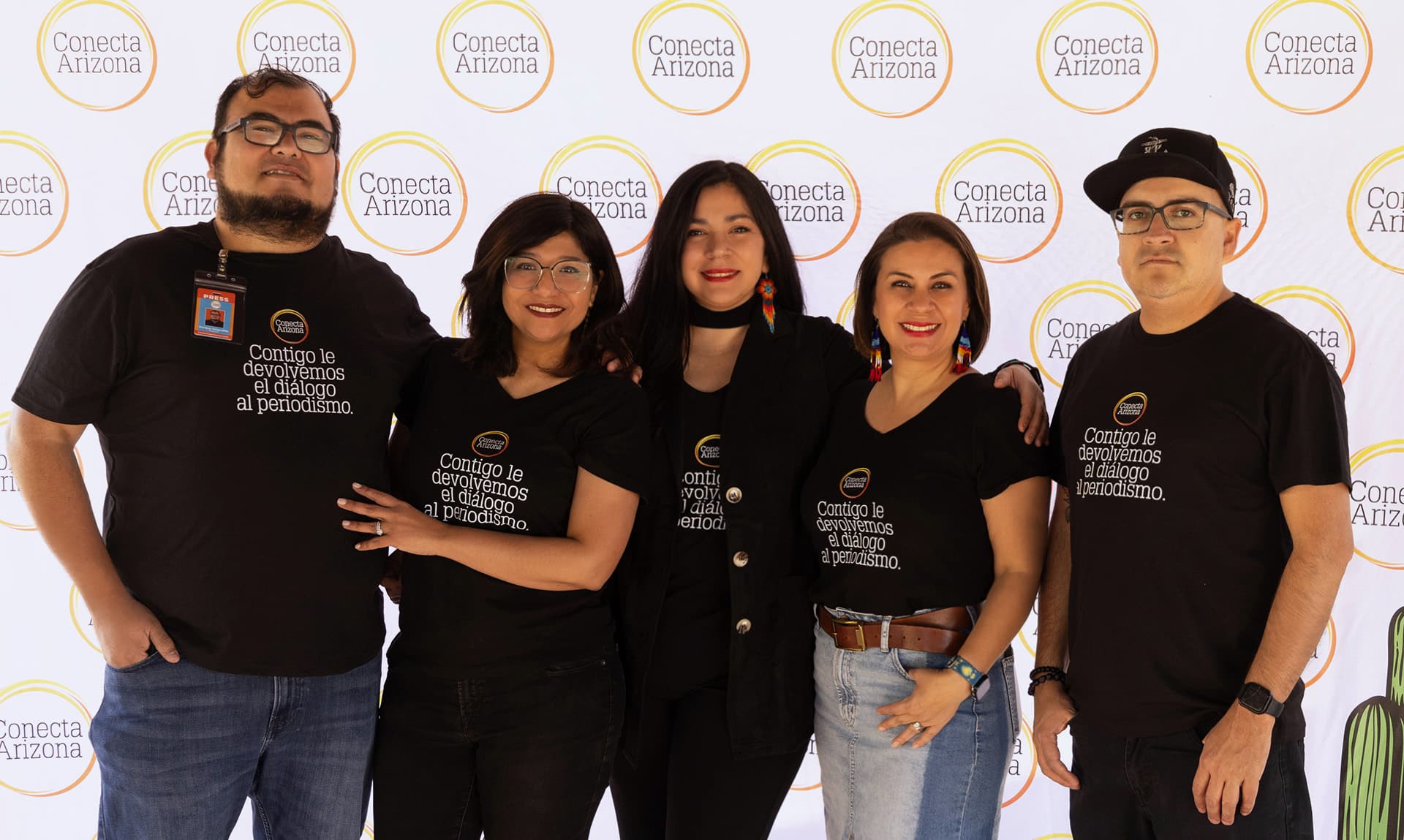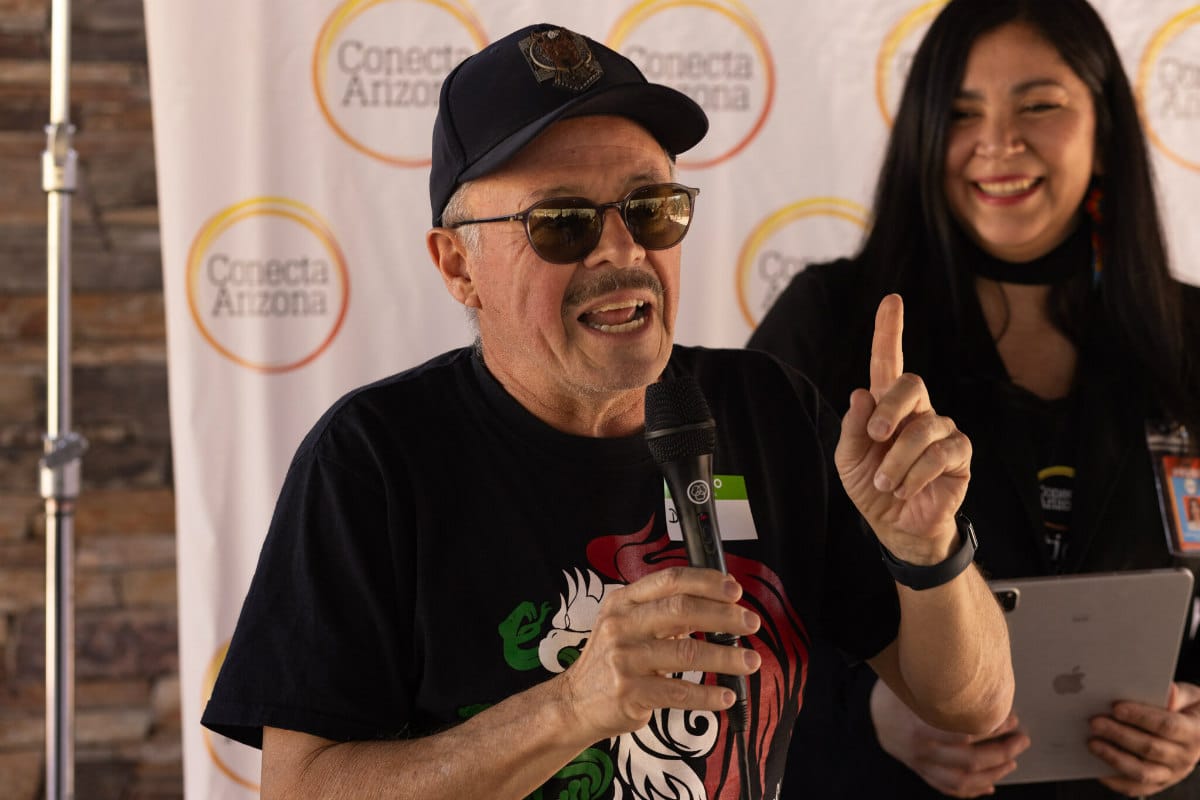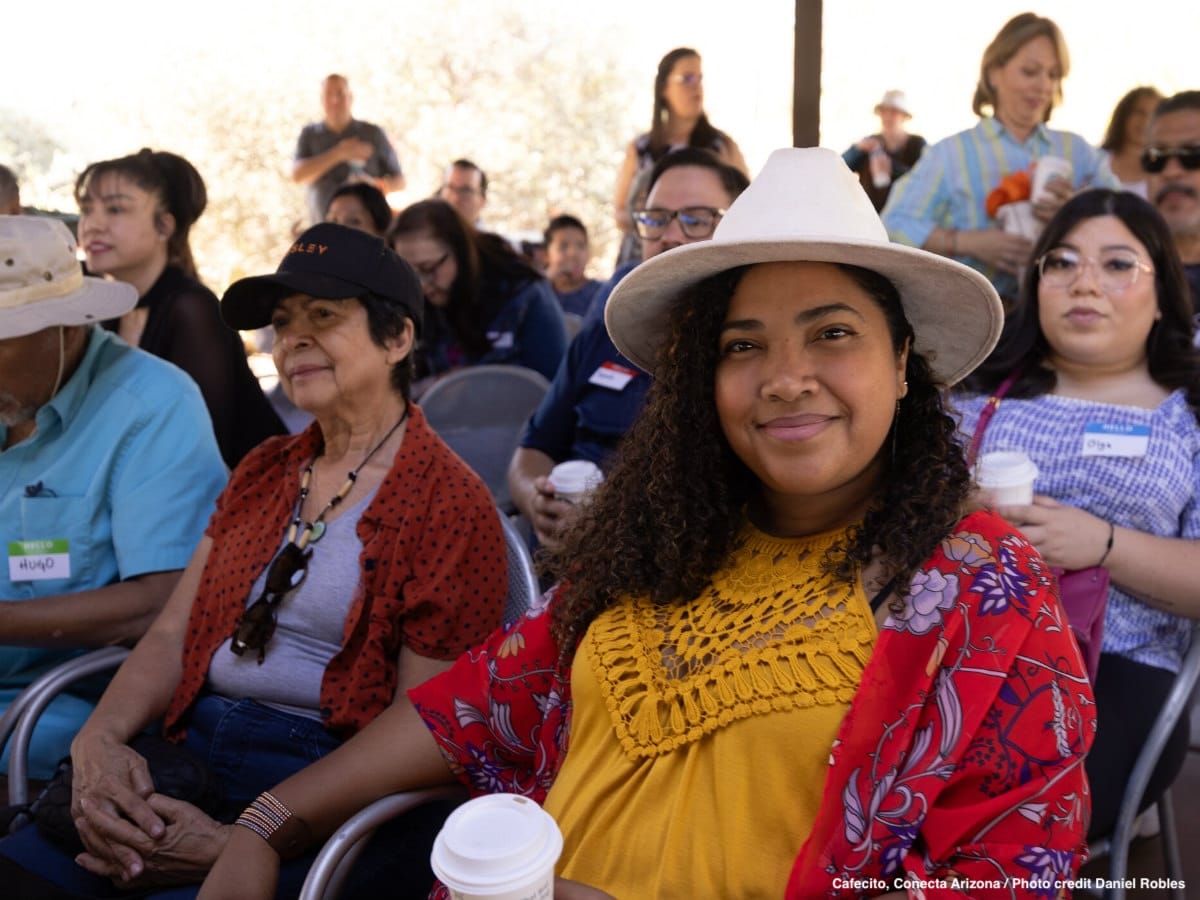Listen to the audio version of this article (generated by AI).
In Phoenix, Arizona, above Grand Avenue and 11th Avenue, a large billboard by California-based artist Karen Fiorito features a striking visual composition with President Donald Trump at its center: crowned, topless, and sunken in a swamp. In his right hand, he holds a golden selfie-style cell phone; in his left, a tiny green tank top. Around his neck hangs a golden medallion that evokes more the mafia than royalty. The artwork, titled “Swamp King,” portrays the president as a figure trapped in his own.
Not far, in Tucson, a city just south of Phoenix, a restaurant serves the “Maga Burger.” The owner, a naturalized U.S. citizen from El Salvador, shares with journalist Maritza Félix during an interview for her outlet Conecta Arizona his motives for the name. “In this restaurant, President Trump is loved and blessed,” he says. We are only one month away from the congressional elections in southern Arizona, scheduled for September 2025.
An undocumented Mexican woman, who has three children—one a U.S. resident with a visa and the other two U.S. citizens—tells Félix that she has faced deportation multiple times. Yet, she describes the current presidency as “the miracle that God is sending me so I can get my papers in order.”
Since Trump took office, his administration has intensified its crackdown on immigration. Despite this, the views of Latinos regarding these new policies and the current deportation campaign are highly divided. Even those with legal immigration status, but not citizenship, are supporters of the same president who oversees their potential deportations.
As I connect with Maritza Félix for a Zoom discussion, we both recognize that, as Mexican and American citizens navigate evolving immigration policies, her team at Conecta Arizona has found itself engaging with “an interesting Latino audience filled with complexities.” She adds, “As human beings, we tend to create echo chambers, but we are breaking those bubbles by exposing different views within the Latino community.”
Five years ago, Félix founded the hyper-local journalism platform Conecta Arizona almost by accident. She initially started a WhatsApp group with family and friends living in Arizona and Mexico to stay connected during the pandemic when visiting was restricted due to border closures. People kept joining the group, as Félix was firing off corrections or fact-checks every time they forwarded something silly or false about how to protect themselves from the coronavirus.

A former TV producer, Félix had previously reported on immigrant communities but felt detached from their reality. Determined to bridge that gap, she broke down from the traditional model of journalism and began to fill an absolute lack of information in Latinx communities, which couldn’t discern when it was questionable enough to look up and didn’t find verifiable information in Spanish in their national news outlets. “Many were essential workers who, despite the pandemic, had to go out to work. As we launched Conecta Arizona in 2020, we began paying attention to these communities, we supported them, we connected them with experts, and that’s how we became a constant in their lives,” says Félix. Conecta Arizona began to cover stories that reflected the realities of Mexican American life, reshaping the narrative about the border and providing essential resources to readers.
Also, 2020 was a presidential election year. Donald Trump was running for reelection amidst a swirl of conspiracy theories and the attack on the Capitol. Félix made a significant move by producing practical journalism that addressed misinformation and explained how the election’s outcome would affect Latino communities. “Straightforward things that major media outlets were not paying attention to, or didn’t have the resources to cover. We were collecting all of that and turning it into content,” she says. In Arizona, one in three voters is Latino, and it is a “swing state,” making it a critical one in the election.
Joe Biden narrowly won Arizona in 2020 by just 0.3%—the first Democratic presidential victory in the state since Bill Clinton. In the 2024 election, Donald Trump reclaimed Arizona with a 5.5% margin—the most significant victory by a Republican in the state since 2012.
Days before Trump’s second presidential inauguration, Conecta Arizona published recommendations on how to interact with border guards, how to behave at protests, and what to do if federal or local agents come to your home or detain you while driving. This early advice proved beneficial. “The day after Trump took office as president of the United States, we received 819 messages. I’m sharing the exact number because I counted the messages from people reporting operations, raids, and the like. While we haven’t confirmed any massive raids in Arizona so far, we have seen numerous operations targeting specific individuals whose immigration cases were closed long ago. Under the new directives of this administration, they are now being required to appear in court,” explains Félix.
I wonder how Conecta Arizona balances the differing views of its growing audience, mainly Latinos, on immigration and deportation policy. How do they engage in community dialogue and maintain the community grounded?
Every afternoon, from 2:00 to 3:00 p.m. Arizona time, Monday through Friday, Conecta Arizona opens a WhatsApp group called Cafecito, where journalists engage with the community on a wide range of topics. Discussions can range from celebrity news, such as divorces, to sports victories, and political developments like Trump’s latest actions. Once a week, they invite an expert—be it a doctor, a lawyer, or a consul—to speak to the community and answer questions. Sometimes, conversations become so intense that, according to Félix, she has to step in to restore calm.
Recommended Read: Creating “Families” That Transform a Neighborhood – With Thread
“Encouraging these digital discussions is quite challenging, but it’s rewarding to see how the community feels and to provide them with a space to debate,” Félix explains. “They also get to know the journalists behind the publication, which allows them to hold us accountable for our actions. We discuss with them what we publish and why. I believe that this dialogue with the community is crucial for the detailed work we do.” For Félix, stories are not solely derived from press releases; they emerge from afternoons filled with dialogue.
The Cafecito conversations have also transitioned to face-to-face, regular live events in Tucson and Hermosillo, as well as Sonora, Mexico. However, this year has been particularly challenging. “There’s a lot of intimidation. They park patrol cars or ICE vehicles outside the venues, sanctioning people on the spot to discourage attendance,” explains Félix. Nevertheless, many Latinos continue to show up. These conversations among Latinos foster a human connection that makes the debate and different views on immigration and deportation feel more genuine, valid, and nuanced. “Initially, many attendees expressed, ‘I voted for Trump, and that’s great because no one wants to live in an unsafe country.’ Now, individuals who have experienced racial profiling are saying, ‘I didn’t know this could happen to me or my family.’”
However, Félix emphasizes that Latinos remain deeply divided. “Many people won’t change their minds, and we’re certain about that, but at least we’ve increased our willingness to listen to one another,” she observes.

Conecta Arizona often publishes content that isn’t always the most popular. Therefore, they have sought advice and support from various organizations to help them in the event of a lawsuit or encounter with federal or local agents due to their background. For instance, they have put into question the law enacted on July 4th, known as the “One Big Beautiful Bill Act,” because it would affect migrant families in Arizona. Despite facing public backlash, Félix states, “Although we strive to provide balanced content, it can be difficult when people refuse to engage reasonably.” However, she assures her audience that they will continue to “challenge this and any future laws that may directly affect our families, regardless of the administration or political party.”
Félix notes that even Latinos who have no particular critical views of the current deportation campaign have begun to follow Conecta Arizona and participate in Cafecito, as they feel disconnected from their communities. With the way things have been handled in the first six months of the new administration, some leaders and conservative activists have lost the community’s social conscience. “Through us, they can feel the pulse of the community, and it’s great that they can still be aware of what’s happening to others,” Félix explains.
Félix frequently receives messages from her audience, such as: “Where can I vote?” “Can you accompany me to the courts?” “I’ve been deported,” or “My child was beaten.” As we conclude our discussion, Félix recounts a recent incident involving a stabbing at a high school where one of her participants in the Cafecito WhatsApp group is a teacher. “He shared videos of the incident with us. And I thought: Having people trust us enough to open up and share such experiences is a demonstration of love, which we also need to reciprocate and commemorate in some way.” Ultimately, it’s not just the story that matters, but also who is telling it.





